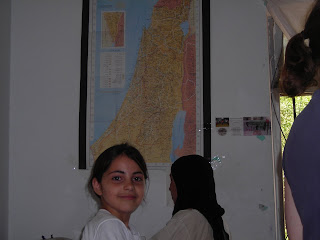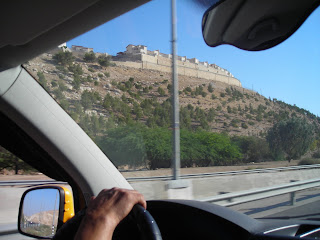


I must tell you about our visit to the Bedouin settlement today. It is the last day of our summer camp, and I am leaving for Jerusalem tomorrow afternoon. I don't know when I will get to write again. It will be a very different kind of blog, because I will be in Israel prior to coming home, and I will be sad at not being here, feeling my loss, feeling the contrast between my time here among the friendly Palestinians, and trying to come to terms with the very different westernised and not so very friendly Israeli culture.
But today, we visited a Bedouin camp outside Abu Dis. The reason was to plant some trees. It is a symbolic act because this land has been designated to be the site of yet more Israeli settlements. There is a plan to turn a whole sweep of land from here, near Jerusalem, down to the Dead Sea into a series of settlements. There is already Ma'ale Adumim, and Qidar. The idea I am told, is to create a ring of settlements around Jerusalem in a circle. That way, the Palestinian areas will be split up and separated from each other, and a state will become impossible. Somebody said yesterday, 'One day the wall at Abu Dis will be taken down because there won't be any Palestinians here any more.
So we go to the Bedouin settlement to make our point, to plant some symbolic trees - olives because they endure and last. These Bedouin people have already been moved here from Israel on to Palestinian land. They are going to be moved again nearer to Ma'ale Adumim and this will be turned into another settlement. All of us, kids and volunteers, load into a number of camper vans. We leave the town, leave the tarmacked road on to a rough track. The countryside becomes very barren. Bare dusty hills, and eventually we come to the Bedouin encampment - a group of corrugated metal shacks. It is very hot. Here and there are some corralled animals - some donkeys and goats. We scramble down and then up a hill and start to plant our trees. There is a crew from a local television channel and Dr. Abdullah gives an interview about what we are doing. Lots of photographs of the saplings. Focused energy from the kids who are digging holes in the ground under the furious heat.
Water or lack of water is a huge problem here, and another cause of bitterness on the part of Palestinians. Several people have told me that under the terms of the 1993 Oslo accords, severe limitations were imposed on the ability of Palestinians to extract water, and restrictions on how deep into the earth they can mine. They say that Israel gets the easily-obtained water and as a result they get a disproportionate amount. Israel is drawing water off from the Jordan river and as a result the Dead Sea is shrinking, may vanish altogether in a few years. Certainly my overwhelming impression of the Palestinian landscape, especially this time of year is of dryness. The hills where we are are completely barren. At the very top of a hill above us is part of the settlement of Qidar. From here I can see the edge of a garden which looks as if it has access to far more water than anything down here.
We spend an hour or so here, planting trees, photographing each other, swigging from our bottles of orange-juice and water. Then we load into our camper vans and start returning to the town. On the way back, the usual chanting from the kids. One of them leans out from the window at the front of the van into the wind. At one point our van runs out of fuel and we have to pull into the side of the road and wait for one of the other vans to return with some more in a bottle.
When we get back to the community centre, we all say goodbye to each other, because this is the last day of the summer camp. Tomorrow morning there will be a farewell party and I will be moving to Jerusalem.





 I have started to prepare for leaving here. It is Tuesday morning, in another two dahys I will be leaving Abu Dis to spend two or three days in Israel proper as part of my 'alibi' cover story to tell officials at Tel Aviv airport who will want to know what I have been doing for the last month. They won't want to know that I have been in a town in the Palestinian territories. So I will have to post back to myself in London all 'incriminating' stuff such as friends' email addresses, telephone numbers and messages which I am going to delete off my mobile, anything in Arabic, photographs of course, which I am going to upload on to my email account and then delete off my camera. I hate and resent having to behave acting like a criminal. It just shows how much the Palestinian territories is not a state, has not been allowed to have the makings of a state, has no control of its own borders, who comes in and who comes out, even within its borders the Palestinian authority has very limited control.
I have started to prepare for leaving here. It is Tuesday morning, in another two dahys I will be leaving Abu Dis to spend two or three days in Israel proper as part of my 'alibi' cover story to tell officials at Tel Aviv airport who will want to know what I have been doing for the last month. They won't want to know that I have been in a town in the Palestinian territories. So I will have to post back to myself in London all 'incriminating' stuff such as friends' email addresses, telephone numbers and messages which I am going to delete off my mobile, anything in Arabic, photographs of course, which I am going to upload on to my email account and then delete off my camera. I hate and resent having to behave acting like a criminal. It just shows how much the Palestinian territories is not a state, has not been allowed to have the makings of a state, has no control of its own borders, who comes in and who comes out, even within its borders the Palestinian authority has very limited control.























